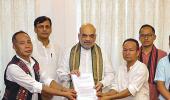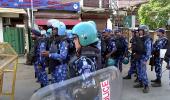'Deeply hurt by Modi's conspicuous silence since the outbreak of violence, people in Manipur came on the roads and crushed their radio sets to express their frustration and anger.'
'The fact that Modi's Mann Ki Baat did not have a single reference to the Manipur violence further accentuated this hurt and anger.'

There is no halt to the humanitarian and security crisis that has engulfed Manipur since May 3.
The two major communities of the North Eastern state, the Meitei and Kukis, are at loggerheads and even Union Home Minister Amit A Shah's visit to Manipur late last month did not make any difference on the ground.
In the capital Imphal, protestors crushed radio sets after Prime Minister Narendra D Modi's Mann Ki Baat on Sunday, June 18, 2023, ended.
Kham Khan Suan Hausing, tells Syed Firdaus Ashraf/Rediff.com, what is keeping the unrest in Manipur alive.
Kham Khan Suan Hausing is professor and head, department of political science, University of Hyderabad. He is also senior fellow, Centre for Multilevel Federalism, Institute of Social Sciences, New Delhi.
The first of a two-part e-mail interview:
Why has the central government failed to solve the Manipur problem?
It is extremely sad and disappointing that the violence in Manipur has not ceased even after a month-and-a-half of its outbreak.
Although the Centre has deployed over 40,000 paramilitary forces, their service is not fully harnessed because of the Centre's lack of political will to formally invoke Article 355 and impose President's rule in the state.
Having a unified security command under the supervision of Kuldeep Singh, the security advisor to Chief Minister Biren Singh, may be useful to send out a political optic that the Centre takes security matters seriously.
However, allowing this proxy arrangement to continue without formally invoking relevant provisions of the Constitution to deal with complete breakdown of law and order under the nose of Biren Singh has circumscribed the role of central paramilitary forces merely to 'aid' the state police in maintaining 'law and order' in the state.
The Bharatiya Janata Party must realise that this proxy arrangement has not only opened up a problematic division of labour between the central forces and the state police, which has not been useful in securing peace and stability. It has instead opened up a new site of confrontation.
The recent stand-off between the central forces and the state police at Serou, when the state police accused the Assam Rifles of obstructing their attempt to maintain law and order in the foothills, is a case in point.
Credible reports on the ground suggest that in the name of conducting combing operations, the state police has persistently provided security cover to armed Meitei militant groups like Arambai Tenggol and Meitei Leepun to launch offensive attacks and arsons against the Kuki-Zomi villages in the foothills.
Apparently, the Assam Rifles and the central forces, which are tasked to secure buffer zones in the foothills, are increasingly framed as anti-Meitei by Meira Paibis, a torch-bearing women's group.
Unlike the Meira Paibis and other frontal Meitei organisations in the valley, the central forces are largely seen as guardians of peace and security by the Kuki-Zomi groups in the hills.
Such an instance also unfortunately leverages contesting positions taken by the Meitei and Kuki-Zomi communities on the neutrality of the security forces.
This proxy arrangement remains one of the major sources of structural violence in the state which, if not immediately addressed, is likely to seriously undermine the foundation on which the 'double engine sarkar' rests.
Manipur cannot be allowed to remain as an island of lawlessness.
What caused the people of Manipur to crush the radio sets when Prime Minister Modi's Mann Ki Baat programme was going on? Why are they upset with Modi?
The deafening silence of Prime Minister Narendra Modi has grievously hurt the people of Manipur. This is in sharp contrast to the 19 election rallies attended by Modi during the Karnataka elections, his immediate visit and solidarity with the victims of the Balasore train accident on June 3, and his reference to the Biparjoy cyclone in Gujarat.
The people of Manipur feel that Modi and his BJP government at the Centre have completely abdicated their Constitutional responsibility to address the complete breakdown of law and order, extensive human tragedy, displacement and dislocation that the violence entailed in the state since May 3.
Deeply hurt by Modi's conspicuous silence for over a month-and-a-half since the outbreak of violence, people in Manipur came on the roads and crushed their radio sets to express their frustration and anger.
The fact that Modi's Mann Ki Baat did not have a single reference to the Manipur violence further accentuated this hurt and anger.
Home Minister Amit Shah visited Manipur on May 29 and appealed for 15 days of peace. Why did his words fail to calm down the situation in the state?
Have the people of Manipur who voted for the BJP in the last assembly elections lost trust in the party?
Sadly and unfortunately, Home Minister Amit Shah's appeal for a 15-day peace after his visit to Manipur on May 29 fell on deaf ears.
People's trust in the BJP and the government -- both at the Centre and state -- has been adversely affected as a result.
The Centre's refusal to dismiss Biren Singh and impose President's rule in the state is now increasingly seen as an instance of non-seriousness on the part of the Centre to address the major source of structural violence in the state.
Despite the fact that the Kuki-Zomi groups have completely lost trust in Biren Singh and his BJP government and consider him complicit in the violence, Singh unusually enjoys overwhelming support from large segments of the Meiteis who are now deeply communalised to extend blind support to Singh's integrationist and majoritarian agenda.
The refusal to dismiss Biren Singh in this sense is considered to turn the 'institutionalised riot system' -- to wit, Paul Brass -- into full circle where both the Centre and state seem to be complicit in ways which, far from controlling, have instead perpetuated the violence.
Clearly, the BJP -- both at the Centre and the state -- continues to put a premium on electoral interest above everything else.
The lives of minority tribals do not seem to matter to them at all.
This also exposes the shallow commitment of the party to upholding the rule of law and Constitutional provisions to deal with extraordinary circumstances such as this.
Is President's Rule the only option in Manipur now considering the fact that even Union Minister R K Ranjan Singh's house was destroyed?
The attacks on the house of Union Minister RK Ranjan Singh and Nemcha Kipgen, a tribal cabinet minister, in the heart of Imphal even after massive deployment of central paramilitary forces reinforce the lawlessness in the state.
Immediate imposition of President's rule is the only option left if the Centre is seriously interested in restoring a semblance of law and order in the state.
What makes Chief Minister Biren Singh so irreplaceable for the BJP, considering the fact that 120 people have died under his leadership and there is a total law and order failure?
Despite the complete breakdown of law and order and the unacceptable level of high casualty of human lives, destruction of properties and displacement of people, Biren Singh has unusually enjoyed overwhelming support from large segments of the Meitei society who extend support to his populist and autocratic leadership either out of fear or by choice.
Singh's aggressive push to deepen the Meiteis's integrationist and majoritarian agenda since 2017 seems to have wide popular purchase in the valley areas.
A skilful combination of populist appeal and this agenda ensures that Biren Singh remains as an irreplaceable leader of the BJP in the state.











 © 2025
© 2025